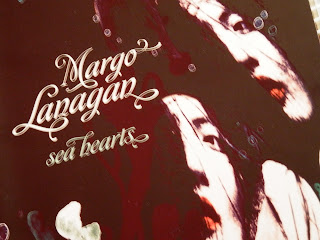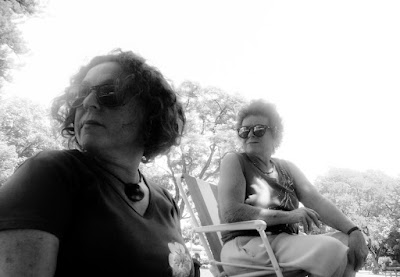Margo Lanagan on weirdness, selkies and camomile tea

Maybe I'm turning into a the kind of obsessed writer who goes on and on about who they admire and why etc etc .. see Hugh Jackman post - mind you, I do have a male heterosexual friend who says he'd turn gay for Hugh Jackman .. Maybee, maybee not, but I do know that when I read Margo Lanagan's short story 'Singing My Sister Down' from her album Black Juice, I was blown away. (Album'? I meant 'collection', though I'm guessing Margo is a little bit rock n roll - Black Juice would def work well as a band name or music album.)
 |
| my very own signed copy of Sea Hearts |
'Sister' which I read last year, is the first short story I've read for the longest time that made me cry. When I spoke to Lanagan this week at Adelaide Writer's Week, which was dedicated to her, I gushed and said I didn't know that writing could do what she did in that story and she replied 'Nor did I. It wasn't until I read the proofs that I realised what I'd done.' 'Sister' opened up my mind to all kinds of possibilities for my own writing.
Just so I don't give you a bum steer, I didn't have a long conversation or interview with Lanagan, it was just a brief interaction while she signed a copy Sea Hearts for me. I bought it after I listened to her read a passage from it as part of the session at Writer's Week where she was interviewed by Sean Williams.
Which brings me to the point (phew! I'm being verbose this evening): Margo Lanagan being interviewed by Sean Williams was the first cab off the rank in the Adelaide Writers Week sessions on Saturday morning, March 3rd. Here are some notes I made, mostly for myself, but Lanagan threw out some gems that other readers might like to pocket. Here goes ...
- ML, when asked to describe her own writing: 'Probably on the weird side. Touches on the dark side .. uncomfortable matters .. fairly straight story lines .. supernatural elements .. makes people feel uncomfortable.''
- I was finding my voice for a long time. Before Black Juice I was writing to audiences.'
- On reading as a child: 'I never got properly obsessed as a child'. She just read what was around. Wanted to be a child genius but got to an age where she realised she wasn't going to be. lol
- 'I was writing poetry in my teens and 20s, like a lot of people do.'
- Describes herself as sitting on the fence between literary and popular fiction, mainstream and spec fiction, youth and adult.
- What makes a collection of short stories? ML: The first 3 were written as collections from scratch to avoid all the stories getting a bit samey (White Time, Black Juice, Red Spikes). She wanted a grab-baggy feel. Black Juice is what her (then) young son calls Coca-Cola.
- On writing short stories: You can cram a whole lot of resonance into them; imply a whole novel's worth. 'Short story writing is all the fun, without the responsibility of a novel.'
- Talked about gaps in the stories making demands in the reader.
- Has a strong sense of the right place to start a story now so she doesn't spend too long changing the opening of stories any more.
- There are scenes of sexual violence in Tender Morsels. There is a taboo around sexual things in YA Lit. The graphicness snuck in in the miscarriage scenes. Lanagan comes at it obliquely, showing the consequences of events rather than dwelling on the event itself.
- She writes about a recognised experience of trauma rather than preaching about how we should acknowledge this and that.
- ML, on Sea Hearts: a tragic romance with fantasy women folded into it. She expanded a novella into Sea Hearts, the novel, to include other people's p.o.v., particularly the witch. Lanagan likes witches, crones. You find them in a lot of myths. They've reached an age where they don't give a fuck (I'm paraphrasing). Lanagan joked, obliquely referring to herself as having reached this age.
- Selkies spend a lot of time yearning.
- Lanagan spends a lot of time working out her magic systems.
- ML, on fairytales: She had to approach those stories sidelong when she was a child, stories like The Magic Pudding ('all that whacking around') and May Gibbs' stories. They were awful and scarey. 'My avoidance things in childhood drew me back.'
- On re-writing fairytales: 'Now children can be traumatised in new and unusual ways.'
- ML and Angela Carter? Drawn to the same things.
- Biggest mistake novice writers make: Have nothing happen. She describes this kind of story as a camomile tea story.
- Describes herself as an intuitive writer: 'It's a blurb, not a brain thing.'
- On the beginning of a story: .. is just after the change that has started something cataclysmic. You might get a flashback to see what they were doing previously, but generally she likes to grab people by the throat, just as James Thierree did in Raoul which she saw the night b4, which was btw, brilliant brilliant brilliant (my gush).
- On gathering ideas: She goes out into the world as a writer with notebook, maybe the country, a museum, anywhere really, and will write down 3 new ideas. She very rarely sits down to write without an idea or a sense of direction of where the story is going.
- She taught herself to write quite fast (10 pages/day) writing formulaic teen romance under fluffy white bread pseudonyms.
- The message and theme tend to grow in the stories themselves rather than trying to give a msg or a lesson; she focusses on the characters journey and story; she avoids preaching, especially for young people.
- ML, on planning stories: Has an idea of where to start (in plot terms) and a rough idea of where it's going. She doesn't really plan out a short story because 'it's small enough to hold in my head.' She sees it as more organic than a novel and writes them fairly quickly.
Caroline x


Comments
Really wanted to meet Margo but somehow missed her in all the CYOA organising! This has shown me that taking notes while listening to these interviews is a great thing to do.
Cheers,
Em
The note taking helps me to remember what was said, and also makes the session much more vivid when I want to recall it. Hope you get something out of them.
Caroline